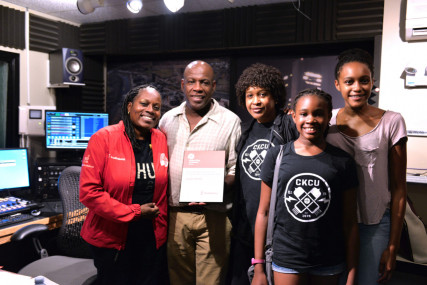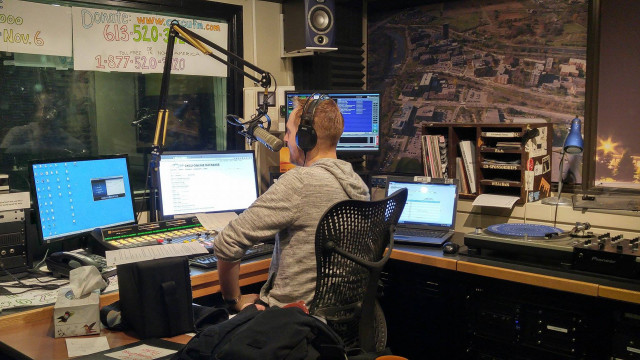Why we need campus radio, and how Ontario’s Student Choice Initiative could kill it
By allowing university students to opt out of paying small fees for campus radio stations, the Ontario government’s Student Choice Initiative will not just rob students of a rich campus life, but prevent local musicians from being heard, and music scenes from thriving.

CKCU's Junior Smith, host of Reggae in The Fields, was awarded the United Way Community Builder Award.
Before cellphones and Bluetooth and Shazam, I used to pull my car over a lot in search of a phone booth. Every time (except for the one Superman fantasy dream sequence), it was because I had just heard an amazing song on CKCU 93.1 FM, one of Ottawa’s campus/community radio stations. I had to call in right away to find out what the song was. Imagine explaining these sudden stops when you had a passenger in the car. Oh, who am I kidding? If you were in the car with me, you probably loved music too.
That’s just it: I love sharing music and having others share it with me. That led me to CKCU as a student at Carleton University in the ’90s. I had started listening to the station in high school, so when I attended Carleton for journalism, I knew I had to become part of the Mighty 93.1 FM. After a brief stint in an overnight slot, I switched to Thursday mornings in August 1997 and have been there ever since. Twenty-two years this summer. That’s just over half of my life hosting a show on campus/community radio.

Ryan Bresee on the air at CKCU in Ottawa
Working at the radio station meant that I could focus on television journalism while in school and still learn a great deal about radio broadcasting in my own time. It meant I created contacts from a variety of different communities. Any journalist will tell you how important those networks can be. I have MCed dozens of big and small concerts. My show has led to me being a juror for the Polaris Music Prize and the Prism Prize. I am constantly exposed to amazing music and have interviewed hundreds of bands, including some of my all-time favourites.
But this isn’t really about me. This is about the people and communities that will lose out when the Ontario government’s Student Choice Initiative kicks in.
Right now, students at universities pay student levies that support a variety of services and organizations on campus. These include student food banks, special status groups, student unions and, of course, campus radio and newspapers. Groups like this are an important part of the post-secondary experience. Imagine a student has the chance to go to university in Montreal with a full suite of student services—or in Toronto, where many of those services have disappeared. If your program is available outside of Ontario, why wouldn’t you want to go somewhere that provides a well-rounded experience? The Ford government would allow students to opt out of paying for these services.
What’s funny about the name Student Choice Initiative (and by funny, I mean sad) is that it will actually lead to far fewer choices for students on campus.
These levies, which were voted in by a majority of students, account for over half of CKCU's operating budget. For the radio station, the levy is about $14 per student. That’s the price of a couple of pints of beer per year, yet we are anticipating at least an 80 per cent opt-out. That’s devastating. Some campus/community stations in Ontario have already started laying off staff.
So how do we replace the lost revenue? We are allowed to have three minutes of ads each hour. Compare that to what sometimes feels like 55 minutes per hour of ads on commercial radio and you can see the hill we have to climb. Do we move somewhere with cheaper rent? Do we lay off staff? Do we shut down a station that has been on the air since 1975? Do we rob a bank? Actually, the station manager has just informed me that the bank thing is no longer an option.
What’s funny about the name Student Choice Initiative (and by funny, I mean sad) is that it will actually lead to far fewer choices being available for students on campus. This will hurt vulnerable student groups the most as support services disappear. The demise of campus radio stations and newspapers will mean Ontario loses some of the best independent and community-made media available. In a country where a few big companies own most of the media, this would be a travesty.
CKCU has programming in 16 different languages. Some of these specialty programs serve as bridges for new immigrants. Imagine the stress and challenges of moving to a new country where you might not speak the language. Then imagine finding a radio program in your language that can help you make ties to the community and resources that understand you and where you came from. The impact is enormous.
Smaller music scenes are given a platform on campus radio. Voices are heard, music is played, scenes grow. Artists that will never get played on commercial radio have a home.
Along with this cultural and linguistic diversity, the impact campus/community radio has on Canadian music can’t be overlooked. Commercial and campus stations have the same Canadian Content rules, but how they are applied is not the same. Commercial stations have a different purpose: they want to broadcast to as many ears as possible so they can get as many advertising dollars as possible. As such, you will hear the same handful of artists over and over. People like to hear the hits, and there’s nothing wrong with that. But on stations like CKCU, you will hear incredible music from Canadians in every genre. Do you have any idea how hard it was for me to find good Canadian rap music to play in 1997? Now, thanks in part to campus/community stations enabling an infrastructure and audience, my biggest problem is deciding which great Canadian rappers to feature.
This fostering and enabling works even better at the local level. Stations like CKCU are made up of people with diverse backgrounds from across the community, both musical and cultural. The smaller music scenes are given a platform on campus/community radio. Voices are heard, music is played, scenes grow. Artists that will never get played on commercial radio have a home. What happens if we lose those homes across the province?
Local music scenes will lose their biggest supporters.
Ontario students will lose the chance to have a richer post-secondary experience.
Independent media will be further silenced.
You’re going to hear the same five artists over and over and over.
I hope those pints of beer are good.
